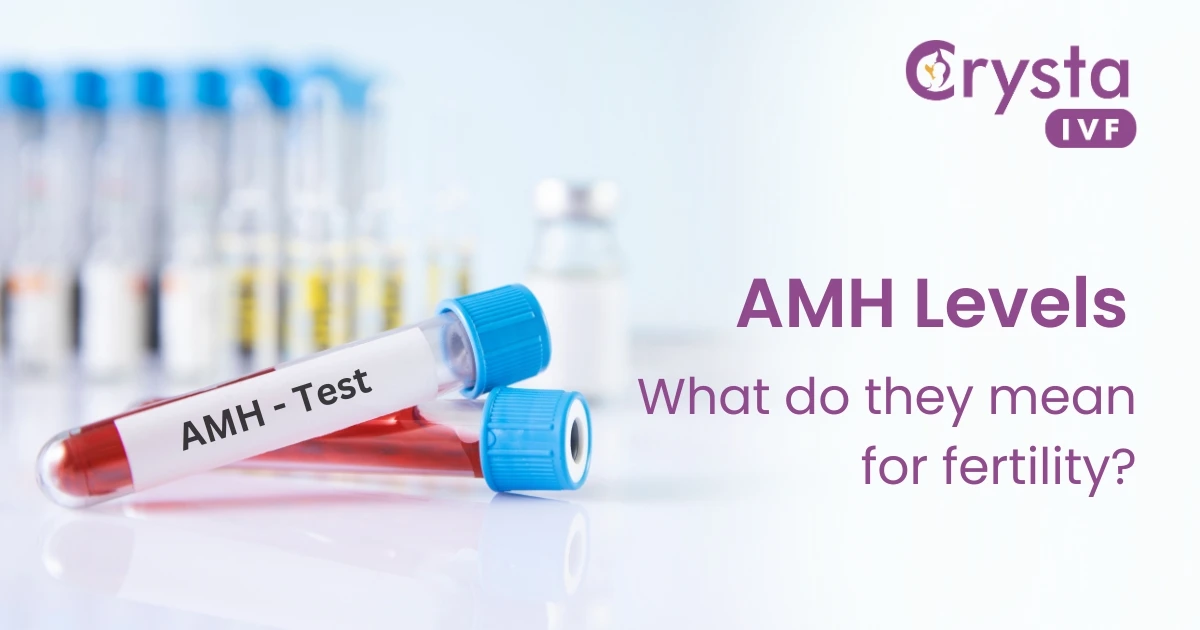
Medically Reviewed By
Dr. Poonam Mishra

Infertility is a more concerned subject than you think; it comes with many downs and constant struggles.
Many couples need to remember to have comprehensive details on the factors that lead to infertility in women, such as AMH levels. Popularly known as the Anti-Mullerian Hormone, AMH is a protein primarily produced in small follicles (tiny pouches containing eggs in the ovaries) by the granola cells.
The granulosa cells are really helpful when it comes to developing eggs in the woman’s ovaries. Ideally, these cells give the maximum percentage of AMH when the follicles are in the preantral and small antral stages of their development.
When the follicles grow larger, the percentage of ALH produced decreases. When the follicle becomes approximately 8mm, the amount of AMH still being produced is almost non-existent. The way the preantral and small antral follicles are always present in the ovaries indicates that AMH levels remain constant from day to day. Making it clear that an AMH test can be performed on any day of the woman’s cycle to identify the number of eggs that are left in the ovaries
Long in short, AMH levels are crucial to maintaining, and that can only be achieved when you signify its presence and try to understand the levels more closely, let’s dive in and apprehend Anti-mullerian hormone more closely with its levels, aka low AMH, causes, test results and treatment but first, let’s talk about low AMH levels.
AMH Levels: A Comprehensive Knowledge
Low AMH levels indicate that your ovaries produce fewer prenatal follicles than expected. By keeping all the points, the AMH levels specifically provide information about the number of eggs in your ovaries.
Therefore, if you have a high AMH level, you have more eggs; if you have a low AMH level, you have fewer eggs left in your ovaries.
Though the AMH levels slowly start to decline when you get old, the trouble begins when you experience low AMH levels in your younger age; at this stage, even the chances of premature ovarian failure start to increase, along with the reduced possibility of getting pregnant naturally. Also, a survey states that in India, the number of women with low AMH levels is rising day by day, making it a crucial health issue that needs to be addressed right now, so it is better to recognize the causes that lead to low AMH levels.
Low AMH Causes
There can be many endless reasons for low AMH, but some of the most common ones are:
- Age of the woman: It is a fact that women with older ages tend to have lower AMH levels than women with younger ages.
- Poor Diet: Not maintaining a healthy diet and including junk food and toxic substances such as alcohol, tobacco, and illicit drugs can also lead to low AMH levels.
- Endometriosis: Endometriosis is a disease in which tissue similar to the uterine line grows outside the uterus and can influence your AMH levels negatively.
- PCOS: It is a condition when a woman has few or very unusually long periods.
- Autoimmune disorder: Having autoimmune disorders such as lupus, rheumatoid arthritis, or type 1 diabetes increases your risk for infertility.
- Mental Health: Higher stress levels directly affect your AMH levels, making it essential to seek fertility treatment.
- Cancer treatment or chemotherapy: The fact that AMH levels decreased following chemotherapy suggests that the treatment directly damaged the granulosa cells and developing follicles, which reduced ovarian reserve and fertility.
- Sedentary lifestyle: lack of physical activity leads to obesity, naturally lowering AMH levels.
From the above-listed pointers, it is clear that low AMH levels affect your fertility and can prevent you from becoming a mother. So before it gets too late, identify the early signs of low AMH and consult a fertility specialist for the best possible, effective treatment.
Symptoms of Low AMH levels
Usually, low AMH levels do not have any specific symptoms. Still, some of the most observant symptoms of low AMH in many women are:
- Irregular periods
- A shorter cycle period
- Premature menopause

So, whenever you notice any of these symptoms, you should consult a fertility expert at the earliest possible time to ensure the possibility of infertility can be overcome at the right time. However, it would also be grateful if you knew how the connection between AMH and fertility works and how you can naturally boost your low AMH levels. To balance your AMH levels naturally, read on.
AMH levels and fertility
The AMH levels are mainly connected with a woman’s ovaries and don’t define infertility, though there is never a direct connection between a woman’s fertility and low AMH levels.
Due to low AMH levels, the number of eggs produced by a woman’s ovaries declines, which increases the risk of miscarriage and abnormal fertilization. Let us look at the AMH test levels to know it more accurately.
Average- Between 1.0 ng/mL to 3.0 ng/mL
Low- Under 1.0 ng/mL
Severely Low- 0.4 ng/mL
So, if you feel your AMH levels are low, don’t worry. Make specific lifestyle changes that can help maintain your AMH levels, and reach out to your fertility expert at the earliest possible time before it gets too late.
How to increase AMH levels naturally?
To increase your AMH levels naturally, you can maintain a healthy diet including but not limited to Berries, oysters, leafy greens, fish, nuts and seeds, etc.
Though if you are trying to conceive, it is better to speak to your fertility expert so they can monitor your health and help you to plan the best diet for you. However, there is a high possibility that the natural way of balancing AMH levels won’t help to an extent, and in the end, you have to take expert advice.
Want to connect with a fertility expert?
Despite all the myths, getting pregnant with high AMH levels is possible when you seek expert advice from a fertility specialist. Every woman has a different body, and the complications they face in an attempt at pregnancy are not so similar either.
The fertility expert will closely monitor your reproductive health and advise you on the best possible treatment, such as IVF (one of the most popular forms of ART that have helped many couples overcome the barrier of infertility in their lives to enjoy the parenthood journey). And if you are searching for the best IVF hospital in Delhi, do not worry.
Being the number one choice of many infertile couples, Crysta IVF ensures every couple can live their dreams of a happy family by working with top-notch, experienced doctors, world-class technology, and ART methods to help you take one step forward to plan your baby.




